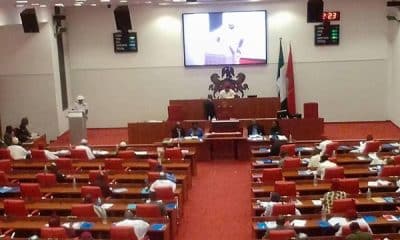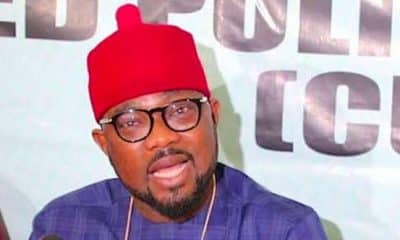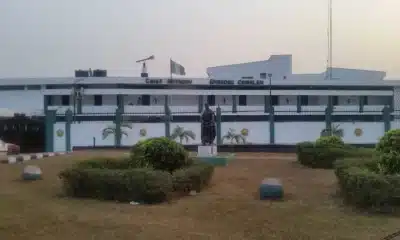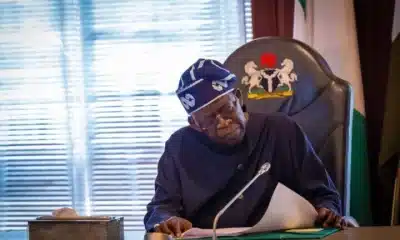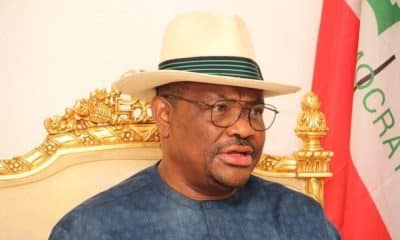Nigeria News
Lawmakers Jostle For National Assembly Leadership
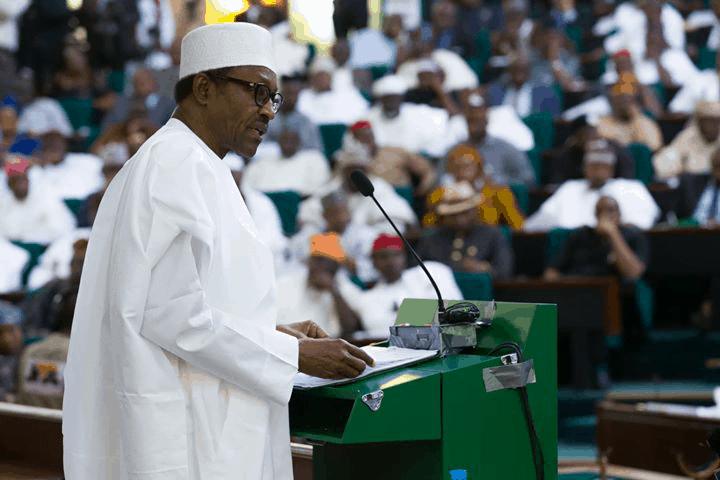
Although some insider sources and vocal party men have said President Muhammadu Buhari and All Progressives Congress (APC) leaders will wait until after Saturday’s governorship election to take final decision on how to zone power sharing in the 9th National Assembly, interested caucuses and party leaders have been meeting to ensure the emergence of their choice candidates even as political zones jostle for the plum seats.
The meetings started a few days after the announcement of results of the Presidential and National Assembly Elections. A top APC leader told The Nation that leaders of the party are not taking the matter lightly, both because of the hindsight of what happened in 2015 and suggestions soon after the NASS elections that the Peoples Democratic Party (PDP) is planning another contest over the leadership of the National Assembly. “That being the case, we are wide awake and prepared to ensure that the National Assembly is led by the right lawmakers. I need not tell you the importance of this if we hope to do better this time around.”
We gathered that even the presidency is very much interested in who sits on which seat at the National Assembly. That is why, unlike what played out in 2015, when the two Houses in the National Assembly chose their leaders without the full participation of the president and the party leadership, The Nation reported on Friday that President Buhari has assured: “his strategists that he won’t be a bystander this time around”.
Buhari who was criticised in 2015 for staying aloof until it was too late, assured this time around that he would be “involved in the talks and intrigues on the election of principal officers of the National Assembly.”
Sources also confirmed at the weekend that the leadership of APC will also be deeply involved in the processes that would lead to the final choice of the new leaders of the Assembly. Besides President Buhari, we learnt that the National Chairman of APC, Adams Oshiomhole, the National Leader of APC, Asiwaju Bola Tinubu and zonal leaders are expected to play major roles in the decision of which aspirant to put forward and even the zoning negotiations. This is part of the plan to ensure that the final resolution would address the needs of all the people.
The party leaders are also of the view that since APC has a clear majority at the National Assembly, it should not contend with any other party as it shoes the principal officers.
It would be recalled that the Independent National Electoral Commission (INEC), announced that in the NASS elections, APC won 65 of the 109 senatorial seats, representing about 59.6 per cent. The main opposition party, PDP, won 42 senatorial seats (40.3 per cent) while the Young Progressives Party (YPP) got one seat or one per cent of the seats.
APC’s majority is repeated even more in the House of Representatives, where it won over 230 of the 360 seats, leaving PDP with over 100 slots.
The zoning debate:
Already, there is debate over the acceptable zoning arrangement for the offices. Insiders confirmed that all the zones, except the Northwest, are interested in providing the four presiding officers of the two Houses. As for the other leadership positions in the two Houses, all the six zones have shown interest. The offices include two presiding officers, Senate President and Deputy Senate President, while the four principal officers are Senate Leader, Deputy Senate Leader, Senate Chief Whip and Senate Deputy Whip.
For example, as soon as the results were announced, all the senators-elect in the party went to Abuja to hold several meetings even as each aspirant lobbied through his geopolitical zone or caucuses. As a result of the realisation that the race, if not properly curtailed, may lead to confusion, stakeholders have called for clear zoning policy for the election of the NASS leaders. The party leadership, as a result, urged all stakeholders to go back to their states for the governorship and other state elections, promising to hold meetings on NASS leadership after yesterday’s elections. The Nation gathered over the week that party of the strategy to forestall any possible misunderstanding and confusion was a decision to come up with a clear zoning formula.
Already, while some are agitating for a reversion to the 2015 zoning arrangement, others are saying recent developments have made it necessary to come up with a new zoning policy that would reflect current realities.
According to Dr Isima Akpan, “part of the new realities is that unlike in 2015, when Southeast and South-south had virtually no elected APC federal lawmakers to be given principal positions, the situation has changed. APC has made a visible inroad into these two zones and so APC has to come up with a zoning arrangement that will reflect this.”
Reports indicate that as at today, Senators-elect from the Northeast seem to dominate the number of aspirants for the principal officers in the Senate even as the other zones are also said to be making serious cases. In fact, some of the new senators-elect from the two zones have been named.
Some of those already mentioned as possible candidates for the office of the Senate President are Senate Leader Ahmad Lawan; former Senate Leader Ali Ndume; former Gombe State Governor and outgoing Committee on Appropriation Chairman Danjuma Goje, ex-Governor Adamu Abdullahi, Sen. Ovie Omo-Agege and former Governor Orji Uzor Kalu. For the Speaker of the House of Representatives, we gathered that forces are already lobbying for it to come to the Southwest. It is said that if this materialises, the outgoing Majority Leader, Hon. Femi Gbajabiamila may emerge as the leading candidate even though a source hinted that he would not be the only candidate from the zone if the plum position is finally zoned to the Southwest.
But advocates of a new policy are agitating that all the zones should be adequately catered for in order to carry everybody along and also to avoid heating up the polity.
To sort out the matter in the interest of the party and the incoming administration, it has been confirmed that the APC leadership would convene a meeting of stakeholders, including the senators-elect this week. A source close to the leadership of APC National Working Committee assured that all the zones will produce principal officers and other important positions in the next government of President Buhari.
According to the source, one of the issues the party leadership will settle with the President this week is how to settle the agitation that if the Northeast retains the position of the Secretary to the Federal Government, currently held by Boss Mustapha, then, the office of the Senate President may no longer be zoned to the area, as is being speculated. If this happens, the remaining zones that do not have President or Vice President, are agitating that for power balance, the position should be zoned to one of them. These are the North-central, South-south and Southeast. The source hinted however that it is also the view of some top APC leaders that North-east should be given the office of Senate President while the office of Secretary to the Government of the Federation (SGF) should be given to either Southeast or South-south.
Just as the office of the Senate President and that of the SGF have become subjects of special interest, the office of the Speaker of the House of Representatives is also a major source of interest. Already, reports quoted sources from the APC leadership as citing both Northeast and Southwest as being highly favoured for this position. However, it seems other zones are also interested in this plum seat.
For example, one of the aspirants for the Speaker’s seat, Hon. Abdulrazak Namdas, who is the Chairman, House of Representatives Committee on Media and Publicity, representing Jada/Ganye/Mayo Belwa/Toungo Federal Constituency of Adamawa State, told newsmen during the week that the party will play a major role in determining who will sit on the seat, when he said: “In the ninth assembly, we are loyal party members; whatever the party decides that is what we are going to do.”
Acknowledging that every zone is interested in NASS leadership positions and has, in fact, commenced lobbying, he said, “we feel that the North-east is the most impoverished. We have only had the speakership for four years and we want to have it for eight years so that we can consolidate.”
Another lawmaker, Hon. Nicholas Ossai, representing Ndokwa/Ukwani Federal Constituency of Delta State, on his part, however, told newsmen during the week that the South-south and the Southeast have competent lawmakers who are capable of holding the position.
“We have experienced hands from the South-east and the South-south in the APC and PDP on both sides.
“At least, Nkiru Onyejeosha is from Abia State and she won under APC and also we still have some old members from Imo State coming under APC. We still have some old hands coming from APC Edo State and some South-south states have APC, PDP; experienced people. I think the position should be well distributed,” he said.
Before stakeholders were advised to go back to their states for the governorship and state House of Assembly elections, no agreement had been reached, especially on the Senate president’s position, but there was speculation that President Buhari may not want to change his SGF immediately. Until the president makes up his mind, possibly early this week, the calculations on which state will produce the Senate President and SGF remain main speculations.

